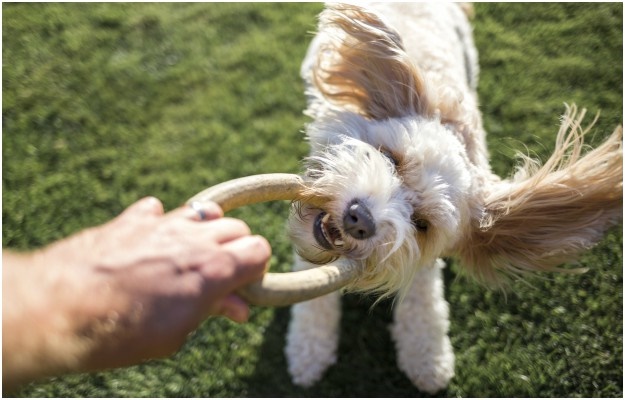
For many it’s an integral part of childhood – growing up in a home with a beloved dog who’s very much part of the family and is always there with tail wagging, ready to play ball or go for a nice long walk. But what happens when a pet attacks a child?
It’s every parent’s fear and it happens more often than you think.
Although there are no reliable statistics in South Africa, emergency services countrywide estimate that they’re called at least once a week to deal with a case in which a dog has attacked a child. Attacks occur even more frequently during school holidays.
Residents of the town of Oudtshoorn in the Western Cape were recently left reeling by news of the death of four-year-old Peter Frans. He was playing in the yard of his home early last month with his family’s dog when the animal turned on him, biting his face and neck. The boy died later in hospital.
And this isn’t the only case that’s made national news in recent weeks. Six-year-old Marchen Hoffman was mauled to death in Stellenbosch when two dogs jumped over their owner’s wall and attacked him while he was playing in a vlei. Meanwhile in Hermanus, 18-month-old Faith Hendricks died after being attacked at home by her father’s pit bull. Her grandmother Evelyn (53) tried in vain to stop the dog and in the process was bitten badly on her arms.
Three high-profile attacks in the space of one month – but the real tragedy, experts say, is they could have been avoided. It all boils down to how you’ve raised both your dog and your children, says Dr Melvyn Greenberg, better known as radio personality Dr Platzhund.
Dogs' body language
It’s important to teach your child to be aware of a dog’s body language, he adds. A dog that jerks back when you want to stroke it softly can suddenly bite, warns Dr Greenberg, who has 42 years’ experience in animal behaviour. A dog that growls and walks away is telling you it doesn’t want you to touch it. Sleeping dogs shouldn’t be woken and eating dogs shouldn’t be disturbed.
No matter what breed of dog it is, parents should be careful when it comes to having dogs around their children, says Lucy Breytenbach, an animal behaviour expert from Cape Town and founder of Just Dogs Behaviour.
She says it’s important that parents don’t miss signs of discomfort in their dogs when they’re near children. “These signs include licking their lips, turning their heads, avoiding eye contact and flattening their ears and bodies. It’s a pity that dogs sometimes feel there’s no option other than to bite.”
Healthy and nutritionally well
Dogs are born good, says Pam Whyte, a “dog whisperer” from Cape Town. A child is safe if a dog’s social instinct is stimulated and the child is seen as one of the pack. But if the dog’s “emergency nervous system” is activated by overexercising and not receiving enough kilojoules, the dog’s heart beats faster, its inhibitions break down and this leads to inappropriate behaviour, she warns.
Dr Greenberg says in America about eight million dogs are put down annually, not because they have cancer or other diseases but because of behavioural problems. Although there are no reliable statistics for South Africa he says he knows most vets put down one dog a month because of a behavioural problem. With more than 2 000 vets in the country this works out to about 24 000 dogs a year.
Here’s advice from experts on how to raise a happy, well-adjusted dog
1. When choosing a puppy, beware of ones that appear nervous.
A dog that jumps into your lap immediately and demands attention, or one that cowers in a corner, could give trouble later. These are signs it might have had a rough start in life and been abused or neglected.
Fear can lead to aggression, Dr Greenberg warns. If you have any concerns about the dog’s temperament at the selection stage, rather follow your gut and choose a different puppy.
2. Take your children and other dogs along to see how your potential new pet reacts.
If you’re getting the pet from a breeder, go to see where the dog was raised – this will give you a better idea about the animal’s temperament. If you’re getting the dog from a shelter, ask about its background.
Was it rescued from traumatic circumstances? This could make it more anxious and more likely to attack when under stress. Shelters can usually tell you if a dog has experience of living with children and other pets.
3. Family dogs have to be taught before the age of five months to get along with anyone.
Take the puppy along when you go shopping so it can be exposed to all sorts of people, Dr Greenberg suggests.
4. A dog should leave your property at least three times a week
Even half an hour of sniffing around outside will do it wonders, Breytenbach says. Dogs that are tied up and never come out start to view the yard – even if it’s a large garden – as their exclusive domain and as soon as a strange child enters it will attack, she warns.
You can’t teach your dog obedience and how to be a good canine citizen if it never leaves your house, Dr Greenberg says. Even a guard dog needs to experience the outside world, Breytenbach adds. Take a walk with it in the evenings; take your baby in a pram and the rest of the kids. The more your guard dog feels like a part of the family the more it will want to protect its family.
5. People have to be assertive and in control.
A dog must earn your attention, Dr Greenberg says. You can teach this by first doing what you need to before spending time with your puppy when you get home from work. Don’t go to it first. The owner must initiate and end all contact.
6. Don’t punish a dog for growling – that’s its warning.
Rather tell your child to back off. If a dog is yelled at for growling it won’t warn any more but rather bite first.
7. Praise your dog for good behaviour.
A dog becomes dysfunctional if it’s constantly punished for what it does wrong but is never rewarded for being good, Dr Greenberg says. Praise it and give it a treat if it does its business outside rather than just hitting it with a newspaper when it pees in the house. But don’t overpraise your canine. A dog that’s praised all the time will start to see itself as the leader and try to discipline people by biting them. It becomes a power play.
8. Each interaction needs to be positive and consistent.
One person mustn’t let the dog sleep on the bed while the other chases the animal away. Avoid mixed signals.
9. Let children know boundaries.
Many parents allow their children to roughhouse with dogs, climbing on top of them and pulling their ears and tails. This can be overwhelming for a dog and might lead to aggressive behaviour.




 Publications
Publications
 Partners
Partners
















